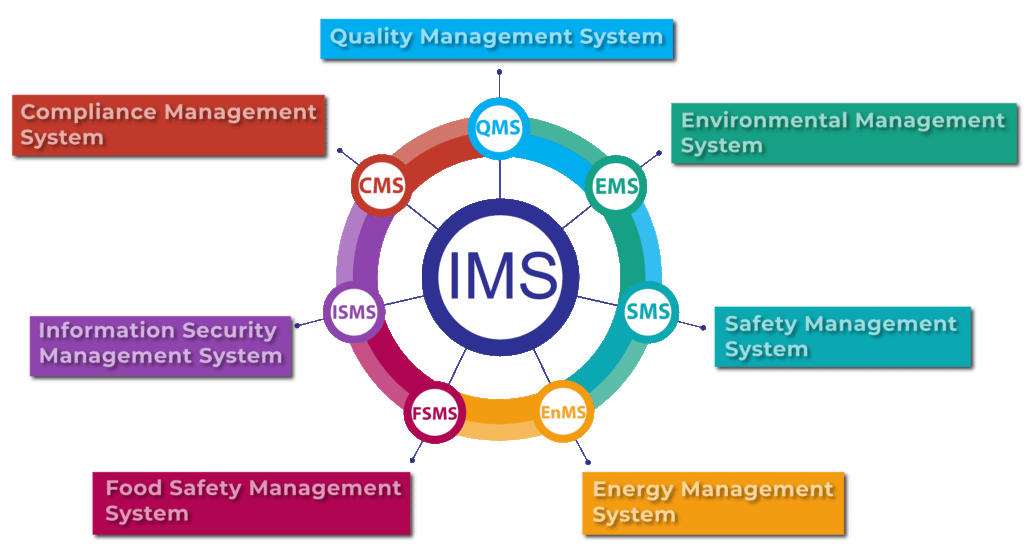
At Envirolink ISO Consultancy, we understand the pivotal role that effective management systems play in fostering organizational success and sustainability. In today’s dynamic business landscape, the integration of various management systems has emerged as a game-changer, driving enhanced efficiency, compliance, and performance. Welcome to the realm of Integrated Management Systems (IMS) – where quality, environmental responsibility, safety, energy efficiency, and more converge to propel your business forward.
Understanding IMS - Integrated Management System
IMS is a holistic approach that combines various management systems into a single framework. At its core, IMS integrates Quality Management System (QMS), Environmental Management System (EMS), Safety Management System (SMS), Energy Management System (EnMS), Food Safety Management System (FSMS), Information Security Management System (ISMS), and more. By harmonizing these systems, IMS streamlines processes, reduces redundancy, and fosters synergy across all facets of your organization.
QMS – Quality Management System
A Quality Management System (QMS) forms the cornerstone of operational excellence. It encompasses policies, processes, and procedures aimed at consistently delivering products or services that meet or exceed customer expectations. At Envirolink ISO Consultancy, we help you implement robust QMS frameworks tailored to your unique business needs, ensuring seamless operations and customer satisfaction.
EMS – Environmental Management System
Environmental sustainability is no longer an option but a necessity in today’s conscientious business world. An Environmental Management System (EMS) enables organizations to identify, manage, monitor, and mitigate their environmental impacts effectively. From KSA to the Middle East, including UAE, Qatar, and Oman, Envirolink ISO Consultancy empowers businesses to adopt eco-friendly practices through comprehensive EMS solutions.
SMS – Safety Management System
Safety is paramount in any workplace. A Safety Management System (SMS) is designed to proactively address occupational hazards, prevent accidents, and promote a culture of safety among employees. Envirolink ISO Consultancy specializes in developing robust SMS frameworks that ensure regulatory compliance and foster a secure work environment across industries and geographies.
EnMS – Energy Management System
In an era of escalating energy costs and environmental concerns, optimizing energy consumption is critical for businesses seeking sustainability and cost-efficiency. An Energy Management System (EnMS) empowers organizations to identify energy-saving opportunities, implement energy-efficient technologies, and reduce their carbon footprint. Envirolink ISO Consultancy offers expert guidance in implementing EnMS solutions that drive energy conservation and financial savings.
FSMS – Food Safety Management System
For businesses operating in the food industry, ensuring the safety and quality of products is non-negotiable. A Food Safety Management System (FSMS) provides a systematic approach to identify, prevent, and manage food safety hazards throughout the supply chain. Envirolink ISO Consultancy equips food-related enterprises in KSA and the Middle East with robust FSMS frameworks, bolstering consumer confidence and regulatory compliance.
- FSSC 22000 Food Safety Certification
- ISO 22000
- SQF
ISMS – Information Security Management System
In today’s digitized landscape, safeguarding sensitive information is paramount for organizational integrity and trust. An Information Security Management System (ISMS) establishes a framework for identifying, assessing, and mitigating information security risks. Envirolink ISO Consultancy offers tailored ISMS solutions to protect your data assets and uphold confidentiality, integrity, and availability across your operations in KSA and the Middle East.
- ISO 27000 Internet Security Management System
Is IMS Right for You?
Envirolink ISO Consultancy, serving clients across KSA and the Middle East (UAE, Qatar, Oman), understands the diverse needs and challenges of organizations in this region
Learn More: Benefits of an Integrated Management System
Learn More: Another benefit of an Integrated Management System is reducing your Audit Time
Combinations
These are some of the most popular combinations of ISO standards that are integrated. We also offer customized packages to support integration of ISO 9001, AS9100, AS9110, AS9120, ISO 13485, IATF 16949, ISO 14001, ISO 27001, ISO 45001, and ISO 50001. Use the chart below, or feel free to contact us!
